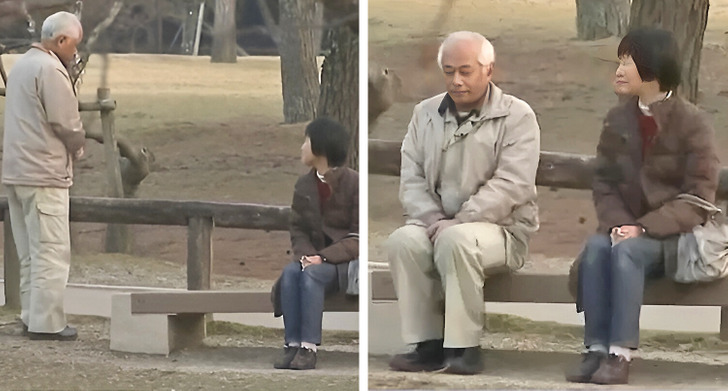The topic of what constitutes a lasting and prosperous marriage has been a subject of ongoing discussion. While effective communication is often considered a crucial factor, a Japanese couple defied expectations by maintaining a 20-year marriage without saying a word. The surprising rationale behind their silent union adds an intriguing twist to their story.
A Japanese husband took the “silent treatment” to a whole new level.

The silent treatment entails the refusal to participate in verbal communication when someone is trying to engage and elicit a response. It is not unusual to observe a pause in communication following an argument.
However, can you imagine the difficulty of being married to a spouse who persistently avoids communication? This was the situation for a couple from the Nara region in Japan. Otou Katayama and his wife Yumi faced a prolonged two-decade rough patch in their relationship.
For decades, the man refrained from speaking to his wife, even though they lived under the same roof.

Otou Katayama continued to reside with his children and wife. Despite Yumi Katayama’s attempts to initiate conversations with her husband, she consistently faced a dearth of genuine responses. Instead, Otou communicated approval or disapproval through non-verbal cues, relying on grunts and nods.
Surprisingly, the idea of seeking a divorce or separation never crossed the wife’s mind. The couple even extended their family by welcoming a third child, all while Otou Katayama maintained his silent demeanor towards his wife.
The reason behind Katayama’s silence is even more surprising.

Years later, the father and husband elucidated the reasons behind imposing a 20-year silent treatment on his wife. Katayama believed he was lacking the attention he desired from his wife, feeling that her care was predominantly focused on their children.
Initially, he merely sulked about the situation, but over time, this evolved into a sense of jealousy toward his kids and his wife, who exhibited deep involvement in the upbringing of their offspring—perhaps a level of involvement that exceeded Katayama’s preferences.
Thanks to a TV show, husband and wife finally exchanged words after 20 years.

After two decades of silence, the adult children of the Japanese couple decided to take matters into their own hands. They approached a TV show, seeking assistance in resolving the longstanding conflict between their parents. TV Hokkaido stepped in to help the children witness Katayama speaking to his wife for the first time.
The children confessed that they couldn’t recall ever hearing a conversation between their parents. TV Hokkaido orchestrated a meeting between Otou and Yumi at a park, the same location as their first date many years ago. Unbeknownst to the spouses, their children, along with the audience, observed the emotional moment unfolding before their eyes.
After some initial hesitation, Otou Katayama finally mustered the courage to speak a few words to his wife, Yumi. In that moment, the husband felt a heightened sense of remorse and understanding regarding the situation. Katayama conveyed to his wife that he was aware of the pain and hardship his prolonged silence had caused her. Despite his regret, he also expressed gratitude to Yumi for standing by him throughout two decades of his silent period, which ultimately came to an end on that day.
Undoubtedly, the relationship between Otou and Yumi is distinctive, much like that of the couple from our previous article who, despite the woman’s disability and the criticism they faced, embarked on the journey of starting a family and became parents.
My Husband Went to Live with His Best Friend Because Our Newborn Was “Too Loud” – I Made Sure He Regretted It

Alice can’t believe her husband Jake has left her and their newborn Lily because he claims their baby is “too loud.” Alone and overwhelmed, Alice turns to his mother for help, determined to show Jake the consequences of his selfishness. With Barbara’s support, Alice plans to make him regret his decision. What is she and Barbara going to do?
I held Lily close, her warm breath a gentle caress against my chest. The living room was shrouded in silence, save for the rhythmic creak of my rocking chair.

A mother rocking her baby to sleep | Source: Midjourney
My mind raced with all the tasks still waiting for me. I was exhausted from washing dishes, yet I cherished these quiet moments with my baby girl. I knew I had to make time to rock her to sleep.
Lily had been with us for just a few weeks. Those weeks were a blur of beautiful chaos and relentless fatigue.

A mother with her baby | Source: Pexels
My days revolved around caring for Lily — feeding her, changing diapers, and trying to keep our home in order. Sleep was a rare luxury, yet every moment with her filled me with gratitude.
At the same time, Jake seemed distant, almost like a shadow in his own home. Even when he was physically present, his mind seemed elsewhere, struggling with the new realities of fatherhood.

A man busy working while his wife looks after their newborn | Source: Pexels
As I held Lily closer, I noticed Jake at the bedroom door, hurriedly packing his clothes into a bag.
“Jake, what are you doing?” I asked, confused.

A man packing his luggage | Source: Midjourney
“I’m going to stay at Mike’s place for a few weeks,” he replied without looking up.
A knot formed in my stomach. “What? Why?”

A shocked woman | Source: Midjourney
Jake zipped up his bag and finally looked at me. “The baby is too loud. I need time to relax from this mess, Alice! When I come back, you better figure out how to make this place livable again!”
His words felt like a punch. “Jake, you can’t just leave. We have a baby! We need you here!” I said.

A couple arguing at home | Source: Pexels
He shrugged, slinging the backpack over his shoulder. “I can’t handle this right now, Alice. I just need some space.”
Tears welled up in my eyes as a plea escaped my lips. “Jake, please, don’t leave us. We need to face this as a family.”
But he shook his head, his expression void of any remorse. “I’ll be back in a few weeks. Just… figure it out,” he said coldly, leaving me shattered by his indifference.

A stern man showing no remorse | Source: Pexels
I looked down at Lily, her tiny face peaceful and unaware of what was happening.
A tear rolled down my cheek as I held her closer, feeling both sad and angry. I knew I had to be strong for her, but at that moment, I felt so alone.

A worried woman with a baby | Source: Freepik
Jake’s departure left me in shock. How could he just walk away like that? His help had always been minimal, but this abandonment was crushing.
In desperation, I reached for the phone. Help was essential, and there was only one person I could think to call: Jake’s mother, Barbara. We had initially wanted privacy after Lily’s birth, but now, more than ever, I needed support.

A senior woman | Source: Midjourney
My hands shook as I dialed her number.
Barbara answered after a few rings, her voice cheerful as always. “Hello, Alice! How are you and my sweet granddaughter?”
“Hi, Barbara,” I said, my voice trembling. “I’m sorry to call you out of the blue, but I really need your help.”

A serious woman with short hair on a call | Source: Midjourney
Barbara’s tone instantly changed, becoming more serious. “What’s wrong, dear?”
“Jake just left. He said he needs time away and won’t be back for a few weeks. I’m overwhelmed with everything. Can you please come over?”

A deeply upset woman on a phone call | Source: Midjourney
There was a pause on the other end of the line. “Of course, Alice. I’ll be there as soon as I can.”
“Thank you, Barbara. I don’t know what else to do!” I replied desperately.
“Hang in there, Alice. We’ll figure this out together,” she consoled me.

A senior woman dressed smartly and talking on a phone | Source: Pexels
I hung up the phone, feeling a small glimmer of hope. Help was on the way. I looked down at Lily, still peacefully sleeping in my arms.
I kissed her tiny forehead and whispered, “It’s going to be okay, sweetheart. We’ll get through this.”

A woman kissing her baby’s forehead | Source: Pexels
I walked over to the couch and sank down, taking deep breaths to calm my racing heart. As I waited, anxiety gnawed at me.
The thought of asking Barbara to stay felt overwhelming — how could I impose that on her? Yet, the daunting question lingered: how would I manage everything on my own? These worries swirled through my mind as I awaited her arrival.

A worried woman | Source: Pexels
I didn’t have any friends who could lend me a hand.
I needed to make a plan and find a way to manage everything on my own if I had to. But at least for tonight, I wouldn’t be alone. Barbara would be here soon, and together, we would figure out what to do next, I reasoned.
The sound of the doorbell broke my thoughts. I stood up, taking a deep breath before opening the door. There stood Barbara.

A young woman and senior woman looking into the mirror | Source: Pexels
I felt a rush of relief as I welcomed her in, knowing that I had made the right call.
“Alice, dear, how are you doing?” she asked, wrapping me in a tight hug.
The floodgates burst open, and I couldn’t control my tears any longer. “Oh, Barbara, it’s been incredibly tough,” I sobbed. “Jake has felt so distant, and now he’s simply walked out on us. He said he needed space and has gone to stay at Mike’s place.”

A sad woman | Source: Midjourney
Barbara listened, her face growing more serious with every word. I told her about the sleepless nights, the endless chores, and the hurtful words Jake had thrown at me.
She didn’t interrupt; just let me pour out all the pain and frustration I’d been holding in.

A woman in tears | Source: Midjourney
When I finally finished, Barbara’s expression was stern. “Where did he say he was going again?”
“Mike’s house,” I replied, wiping my tears.

A serious-looking older woman | Source: Midjourney
Without a moment’s hesitation, Barbara whipped out her phone. “This is completely unacceptable. He needs to be here, supporting you,” she said, her voice firm with resolve.
I watched, holding my breath, as she quickly dialed Jake’s number. It didn’t take long for him to pick up.

A senior woman on call | Source: Pexels
“Jake, this is your mother! I did not raise a man who acts like this! If you treat your family like strangers, I will do the same to you in my will! Get back home and take responsibility!” she said firmly.
I couldn’t hear Jake’s response, but Barbara’s words were enough. She was furious and determined to teach him a lesson.
As she hung up, she turned back to me, her face softening.

A smiling elderly woman | Source: Pexels
“Alice, you’re not alone in this. I’ll stay with you tonight and help with Lily. We’ll make a plan in the morning. If that loser doesn’t come home, I will make sure he regrets walking out on his beautiful family for the rest of his goddamn life!”
I nodded, feeling a mix of relief and gratitude. “Thank you, Barbara. I didn’t know what else to do.”

A close up shot of a young woman | Source: Midjourney
She smiled gently. “We’ll get through this together, Alice. You’re doing a great job. Don’t let Jake’s actions make you think otherwise.”
We spent the rest of the evening taking care of Lily and Barbara also fixed a nice dinner for me. She also took care of the dishes, ensuring I got to rest.

Meal on a table with a person standing nearby | Source: Pexels
The next morning, I sat in the living room with her, feeling both anxious and determined. Lily was in my arms, cooing softly, her tiny hands reaching for my face. I smiled down at her, feeling a bit of comfort in her innocent gaze.
Barbara reached over and stroked Lily’s cheek. “She’s beautiful, Alice. You’re doing a great job.”

A mother holding her baby | Source: Pexels
“Thank you,” I replied, my voice a little shaky. “I just hope Jake comes back today.”
Barbara gave my hand a reassuring squeeze. “We’ll face whatever comes together.”

Two people holding each other’s hands | Source: Unsplash
The minutes ticked by slowly. I glanced at the clock repeatedly, my stomach twisting with nerves. Would Jake actually come back? Or would he just leave us hanging again?
The uncertainty was eating at me.
Just when I was about to lose hope, the front door creaked open.

A person opening a door | Source: Pexels
I held my breath as Jake walked in, looking tired and disheveled. It was clear he hadn’t slept well the night before. He glanced at me, then at Barbara, who nodded silently.
I took a deep breath, bracing myself. “Jake, we need to talk,” I said.

A sad young woman | Source: Midjourney
He remained silent, his gaze fixed on me. I gathered my courage, my voice trembling slightly as I pressed on. “You can’t just walk away when things get challenging, Jake! We have a baby now! Lily needs both of her parents!”
Jake nodded slowly, his silence heavy in the air. Barbara stepped closer, placing a comforting hand on my shoulder. “We’re here to support you, Alice,” she said. “Remember, this is a team effort.”

A happy MIL and DIL | Source: Freepik
I looked at Barbara, a flicker of hope igniting within me. “Thank you, Barbara. Your help means so much to me,” I said, my voice filled with gratitude.
Jake finally broke his silence, his voice low and hesitant. “I know I need to do better.”
I met his gaze, firm and resolute. “This isn’t just about saying the right words, Jake,” I continued. “It’s about showing up every day and being present for your family. We need more than promises now.”

A worried-looking young woman | Source: Midjourney
Barbara rose, her eyes locking onto Jake’s with a fierce intensity. “Actions speak louder than words, Jake. Remember that,” she said.
I knew this was just the beginning. Whether Jake would truly step up remained to be seen, but one thing was clear: I wasn’t alone anymore. With Barbara’s unwavering support, I felt stronger.
Cradling Lily gently, I leaned in close and whispered to her, “We’re going to be okay, sweetheart. One day at a time.”

A sleeping newborn baby | Source: Pexels
What would you have done?



Leave a Reply